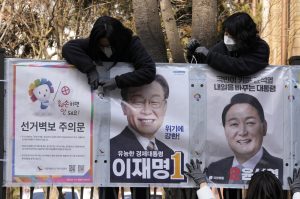When the 22-day official campaign period started on February 15, South Korea’s presidential election, set for March 9, entered its final phase. As it did, Lee Jae-myung from the ruling Democratic Party (DP) and Yoon Suk-yeol from the main opposition conservative People Power Party (PPP) were neck-and-neck; followed by third party candidates Ahn Cheol-soo from the minor opposition centrist People’s Party and Shim Sang-jung from the minor opposition leftist Justice Party. A Gallup survey two weeks before the election showed that Yoon’s support stood at 39.0 percent and Lee’s at 38.3 percent, with a gap of just 0.7 percent between them.
Ahn Cheol-soo, a renowned software entrepreneur and medical doctor, garnered 9.5 percent support in the poll. Ahn emerged as a potential game-changer on February 13, when he proposed to merge his campaign with Yoon by fielding a single candidate based on a popular survey to pick between them. Yoon and the PPP, despite welcoming the idea of a unified candidacy, opposed Ahn’s preemptive proposal, arguing that an opinion survey method could produce “distorted results.” Ahn dropped his offer a week later, citing the lukewarm reception from the PPP.
While the blame game between the two opposition parties intensifies over the failure to merge campaigns, Ahn’s moves – vowing to finish the race on his own while at the same time publicly hinting at his willingness to merge candidacies if “Yoon accepts [his] offer” – have rapidly added further uncertainties to the already tight race.
Unsurprisingly, Lee and the DP are engaged in an all-out campaign to entice Ahn away from the PPP. The ruling party offered to form a coalition government with Ahn’s party, which currently holds three seats in the 300-seat National Assembly.
The feverish courtship of the third party contender was just another twist in the most unpredictable and nastiest presidential election since South Korea democratized in 1987.
To win this duel, Lee and Yoon, along with their parties, have resorted to mudslinging, accusing each other and their respective families of corruption and moral misconduct. At the same time, they have flooded voters with populist pledges and policy proposals to win support, with each candidate claiming to be the decisive leader needed to make South Korea a truly fair and just country.

































